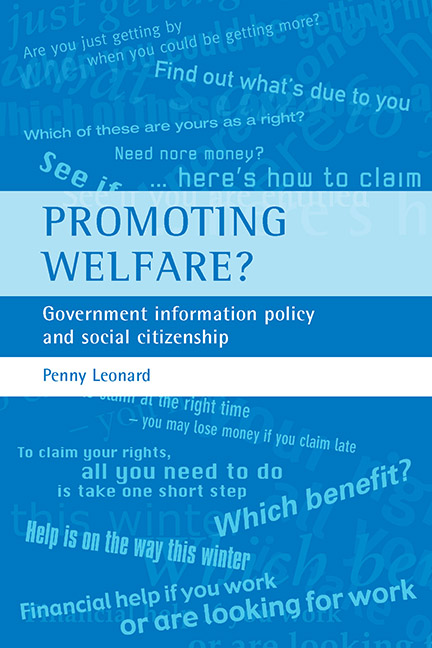Book contents
- Frontmatter
- Contents
- Foreword
- Preface
- List of abbreviations
- one Introduction
- two Citizenship
- three Information
- four Social democracy and information
- five The New Right and information
- six New Labour and information
- seven Case study A: In-work benefits for low wage earners
- eight Case study B: Means-tested benefits for older people
- nine Information for citizenship?
- References
- Appendix A Government expenditure on publicity for social security benefits (1973-98/99)
- Appendix B Sample leaflets and posters
- Index
- Also available from The Policy Press
- Frontmatter
- Contents
- Foreword
- Preface
- List of abbreviations
- one Introduction
- two Citizenship
- three Information
- four Social democracy and information
- five The New Right and information
- six New Labour and information
- seven Case study A: In-work benefits for low wage earners
- eight Case study B: Means-tested benefits for older people
- nine Information for citizenship?
- References
- Appendix A Government expenditure on publicity for social security benefits (1973-98/99)
- Appendix B Sample leaflets and posters
- Index
- Also available from The Policy Press
Summary
Citizenship is a hollow concept if people do not also have access to information. (Steele, 1991, p 47)
To play our part as citizens by participating in society and by fulfilling both the rights and responsibilities of that status, we all need information. Citizenship is a concept which, by definition, aims to be inclusive, and which implies at least some sort of equality and a common shared feeling of belonging. It would seem to follow that information should be available equally to all citizens, and on each of those subjects about which we need to be informed in order to function effectively as citizens. Information is essential for each component of citizenship: civil, political and social. We expect that information to be comprehensive, consistent, accurate and universal. Anything less would deny at least some, if not all, aspects of citizenship for those who are not fully informed or who are misinformed. That would seem to contradict both the basis on which citizenship is ‘bestowed’ (Marshall, 1963) and the values underpinning the postwar social democratic welfare state.
However, this study of information (and the policies that determine its provision) exposes a different reality: information provision is patchy. There appears to be no coherent policy. Practice varies greatly in scale. At one end of the scale are intensive (and expensive) national campaigns that focus on a particular service or benefit (such as the ‘Right to Buy’ publicity campaign, which resulted from the 1980 Housing Act and the Working Families Tax Credit campaign in 1999, for example). At the other is a virtual or complete absence of information available to the public on some other services or benefits (such as education benefits and Severe Hardship Payments for 16- to 17-yearolds). The evidence indicates that policy makers and providers of information make conscious decisions about the purpose, extent, nature and cost of that information. Information about welfare services and benefits, therefore, is not available equally to all those who are entitled to them. The corollary is that the services and benefits themselves are not available equally, either. The ‘information poor’ are a minority group that suffer from indirect (if not direct) discrimination in not being provided with information appropriate to their needs.
- Type
- Chapter
- Information
- Promoting Welfare?Government Information Policy and Social Citizenship, pp. 1 - 8Publisher: Bristol University PressPrint publication year: 2003



